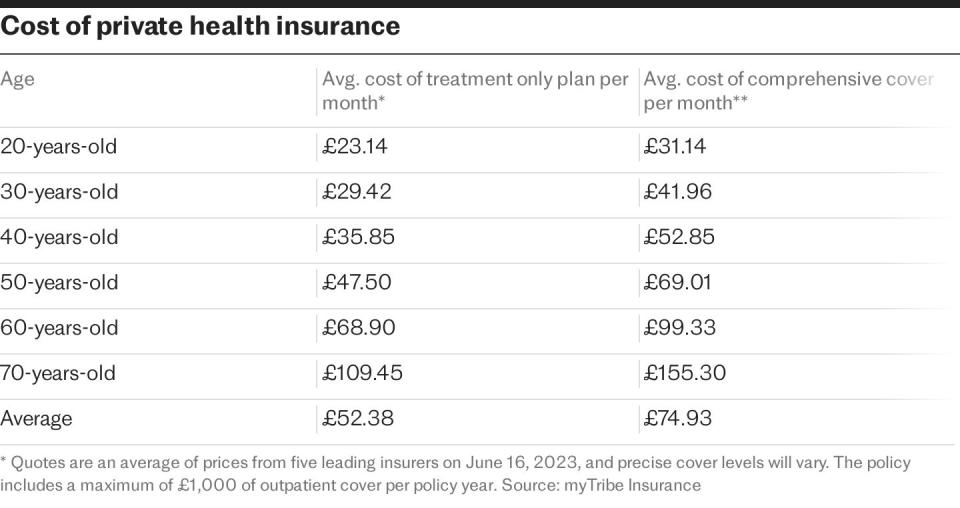Crumbling NHS to push record numbers to private healthcare

Patients are opting for private healthcare in record numbers as the NHS is blighted by long wait times and strike action.
The number of private hospital admissions between January and September 2023 increased 7pc compared to 2022, rising to 664,000, data show.
Analysts are predicting the number of people opting to pay for their own healthcare will rise to record levels this year, as the health service falters.
They expect the number of people opting for medical healthcare to exceed the 836,000 private hospital admissions recorded in 2022.
It comes as Chancellor Jeremy Hunt faces warnings of real-term cuts to the NHS ahead of the spring Budget on Wednesday.
The health service could suffer a 1.2pc reduction in day-to-day spending in England despite ministers promising not to lower the healthcare budget, the Institute of Fiscal Studies (IFS) warned.
NHS waiting lists will remain above pre-Covid levels until 2030, the IFS said last week, despite the Prime Minister’s promise in January last year that times would fall and that “people will get the care they need more quickly”.
The NHS has also faced disruption from doctors striking over pay, with walkouts of both senior and junior medics.
Striking consultants have potentially agreed an improved pay deal with ministers on Tuesday, the Times reported, following extensive government talks.
But there is little hope of progress with striking junior doctors, who are balloting for further walkouts, following action in February.
Brett Hill, head of health at consultancy Broadstone, said: “It has become increasingly difficult for people to access timely NHS healthcare.
“Until the NHS can get on top of its vast waiting list, we expect to see these trends continue, or even accelerate further, and potentially drive a permanent change around how UK workers access the healthcare system moving forward.”
The most popular private procedures included cataract surgery, knee and hip replacements, diagnostic endoscopies and colonoscopies, as well as hernia repairs, according to Private Healthcare Information Network (PHIN), which collects data on private hospitals.
In the second quarter of 2023, 17,300 cataract surgeries were performed privately, and 14,500 patients received private chemotherapy. Cancer survival rates in the UK are lagging 15 years behind other major countries because of a lack of chemotherapy and radiotherapy, research published in the Lancet Oncology journal last week found.
Operation costs can range from anywhere from £2,512 for an adult circumcision or £2,200 for a colonoscopy to £14,449 for a knee replacement or £13,402 for a hip replacement, according to data from myTribe Insurance.
Most admissions are for those aged between 50 and 59, and more women are admitted privately than men.
Of private admissions, private medical insurance, predominantly paid for by employers, was used by 69pc of patients, rising 11pc on the year before.
The remainder chose to pay for procedures out of their own pockets.

The number of admissions paid for “out-of-pocket” by the patient or their family is up by 32pc compared to pre-pandemic levels, but is down by 8pc from the record levels of 72,000 per quarter seen directly after the Covid-19 outbreak.
Richard Wells, who manages PHIN’s data team, said: “It would be very unexpected if hospital admissions in the private healthcare sector don’t hit record levels in 2023 when all the data is collected and analysed.
“After a rapid growth in self-pay following the pandemic, private medical insurance has been firmly reestablished as the primary method of payment for private healthcare and, indeed, is now more popular than before the pandemic,” he said.
A Department of Health and Social Care spokesman said the Government was working on making the health service “faster, simpler and fairer”, and “cutting waiting lists and ensuring people get the care they need”.
“Overall NHS waiting lists have decreased for three months in a row – despite winter pressures and industrial action – and we’ve delivered on our commitment to provide an extra 50 million GP appointments months ahead of schedule, while the recent rollout of Pharmacy First will help to free up 10 million GP appointments per year.
“We are putting record levels of investment into the NHS, and we have commissioned the first ever NHS Long Term Workforce Plan to train and retain the staff our healthcare system will need in the decades to come.”
Recommended
I used to work for the NHS – here's how to never pay care home fees

